Your question is Can I Get An Enum From An Int? The answer is yes you can convert an int to an Enum (with upper-case Enum is a class):
// Works. But is it ideal for the code you posted?
Enum someEnum = (Enum)Enum.ToObject(typeof(ConsoleKey), 49);
The value of someEnum is now ConsoleKey.D1.
You can also convert an int to an enum (with lower case it is a type):
ConsoleKey key = (ConsoleKey)49;
The value of key is now ConsoleKey.D1.
You can also do this in reverse which is (int)ConsoleKey.D1 to get a value of 49.
However let's look at your code which shows a call to ReadKey. The type returned from this method is a ConsoleKeyInfo whose job is to give you all the information you need about the key that was pressed.
Just because you can convert between the two types doesn't mean that you should. You have choices!
One good way to take advantage of the format that it returns is to switch on the value of Key to perform the action you want. This example is a menu-driven game and the menu is looking for a key between 1 and 5.
The ConsoleKey.Key value for the '1' key is ConsoleKey.D1 (and so on...).
static void Main(string[] args)
{
// Loop until a valid int is received.
bool exit = false;
while (!exit)
{
displayMenu();
ConsoleKeyInfo keyInfo = Console.ReadKey();
switch (keyInfo.Key)
{
case ConsoleKey.D1: setup(); break;
case ConsoleKey.D2: createCharacter(); break;
case ConsoleKey.D3: changeAvatar(); break;
case ConsoleKey.D4: editProfile(); break;
case ConsoleKey.D5: play(); break;
case ConsoleKey.Escape: exit = true; break;
default:
Console.Clear();
Console.WriteLine("Please enter a number 1-5");
Thread.Sleep(1000);
break;
}
}
}
Every loop iteration displays a menu:

private static void displayMenu()
{
Console.Clear();
Console.WriteLine("1 - Setup");
Console.WriteLine("2 - Create Character");
Console.WriteLine("3 - Change Avatar");
Console.WriteLine("4 - Edit Profile");
Console.WriteLine("5 - Play");
Console.WriteLine();
Console.WriteLine("Escape key to Exit");
}
And based on the value of ReadKey it will exec one of the five actions or it will exit the game.
private static void setup() { }
private static void createCharacter() { }
private static void changeAvatar() { }
private static void editProfile() { }
private static void play() { }
